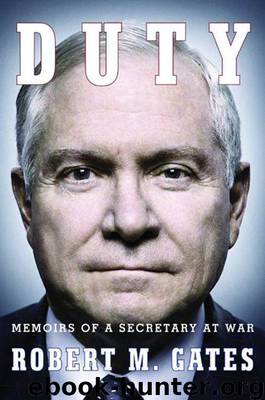Duty by Robert M Gates

Author:Robert M Gates [Robert M Gates]
Language: eng
Format: epub
ISBN: 9780307959485
Published: 2014-03-14T16:00:00+00:00
MY NEW AGENDA AT DEFENSE
By 2009, I had come to believe that the paradigms of both conventional and unconventional war weren’t adequate anymore, as the most likely future conflicts would fall somewhere in between, with a wide range of scale and lethality. Militias and insurgents could get access to sophisticated weapons. Rapidly modernizing militaries, including China’s, would employ “asymmetric” methods to thwart American’s traditional advantages in the air and at sea. Rogue nations like Iran or North Korea would likely use a combination of tactics. Accordingly, I believed that our post–Cold War strategy of being prepared to fight two major regional conflicts at the same time, which determined much of our military’s force structure, was outdated. We needed to sustain and modernize our strategic and conventional capabilities, but we needed also to train and equip for other contingencies.
Working for Obama, I was determined to use the additional time I had been given to shape forces, budgets, and programs along these lines. As the full extent of the country’s economic crisis became apparent, I knew the defense budget was too fat a target for Congress and the president to ignore. I decided to try to preempt a crude, counterproductive, and potentially dangerous grab for defense dollars by showing that we could clean up our own budgetary and programmatic stable. My hope was that if the Pentagon could boldly demonstrate a willingness to reduce bureaucratic overhead and waste while enhancing military capabilities, we might suffer only a glancing blow from the coming budgetary train wreck. I was, shall we say, overly optimistic.
My priorities were clear: to continue taking care of the troops and their families; to achieve greater balance between preparing for future large-scale conflicts and supporting the fights we were already in and most likely to face in coming years, using the budget process to effect that rebalancing; to tackle the military acquisition process and weed out long-overdue, over-budget programs and those that were no longer needed; and to do all I could to enhance our prospects for success in Afghanistan. The first three priorities meant continuing my war on the Pentagon itself, the second and third meant more war with Congress, and the fourth would involve war with the White House. It was clear that every day of my entire tenure as secretary would involve multifront conflict. I wouldn’t have had it any other way. Like both Obama and Bush, I bore easily.
With regard to taking care of the troops, during the fall of 2008 I had heard of a considerable disparity in the time required for medical evacuation from the battlefields in Iraq and Afghanistan—the standard in Iraq was one hour, in Afghanistan it was two hours. As I addressed the matter, I learned that non-U.S. NATO medevac helicopters didn’t fly in “low illumination”—dusk or dark—or in bad weather or into “unsecured” landing zones. Of course, these were most of the times, places, and situations in which medevac would be needed most. Just as troubling, I learned that when U.
Download
This site does not store any files on its server. We only index and link to content provided by other sites. Please contact the content providers to delete copyright contents if any and email us, we'll remove relevant links or contents immediately.
The Radium Girls by Kate Moore(12003)
100 Deadly Skills by Clint Emerson(4901)
Rise and Kill First by Ronen Bergman(4764)
The Templars by Dan Jones(4672)
The Doomsday Machine by Daniel Ellsberg(4475)
The Rape of Nanking by Iris Chang(4191)
Killing England by Bill O'Reilly(3987)
Stalin by Stephen Kotkin(3944)
Hitler in Los Angeles by Steven J. Ross(3935)
12 Strong by Doug Stanton(3539)
Hitler's Monsters by Eric Kurlander(3321)
Blood and Sand by Alex Von Tunzelmann(3181)
The Code Book by Simon Singh(3163)
Darkest Hour by Anthony McCarten(3113)
The Art of War Visualized by Jessica Hagy(2989)
Hitler's Flying Saucers: A Guide to German Flying Discs of the Second World War by Stevens Henry(2742)
Babylon's Ark by Lawrence Anthony(2662)
The Second World Wars by Victor Davis Hanson(2515)
Tobruk by Peter Fitzsimons(2497)
